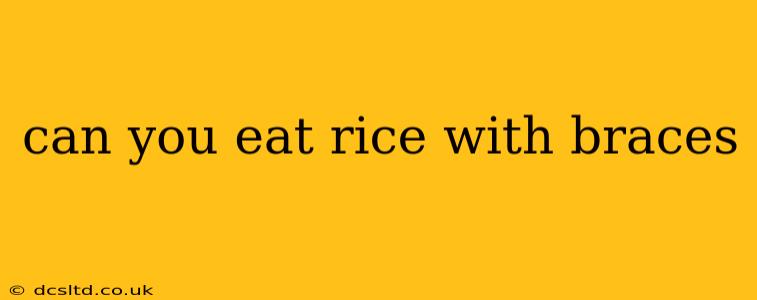Getting braces is a big step towards a straighter, healthier smile. But with new hardware in your mouth, dietary adjustments are essential. One common question many brace-wearers have is: can you eat rice with braces? The answer isn't a simple yes or no. It depends on the type of rice and how you eat it.
What Happens if You Eat Rice With Braces?
The primary concern isn't whether rice itself will damage your braces. Rice, particularly when cooked properly, isn't inherently abrasive. The real risk lies in the potential for sticky rice to become lodged between your teeth and braces, leading to several problems:
- Increased plaque buildup: Sticky rice can trap food particles and bacteria, leading to a buildup of plaque, which can contribute to cavities and gum disease. This is especially true with sticky varieties like sticky rice or risotto.
- Damage to your appliance: While unlikely, extremely hard or chewy rice could potentially bend or break a wire or bracket if you bite down too forcefully.
- Discomfort: Food particles stuck in your braces can be irritating and cause discomfort.
What Kinds of Rice Are Best (and Worst) for Braces?
Let's break down different rice types and their suitability for brace-wearers:
- Best: Plain, cooked white rice, or brown rice (when cooked well). These generally pose the least risk as they tend to be less sticky than other varieties. Make sure to chew thoroughly.
- Worst: Sticky rice (like glutinous rice), risotto, or rice dishes with lots of sticky sauces. These are most likely to get stuck in your braces and cause problems.
How to Eat Rice Safely With Braces
Even with less sticky rice, proper eating habits are crucial:
- Chew thoroughly: This breaks down the rice into smaller, less-sticky pieces, minimizing the chances of it getting lodged in your braces.
- Rinse your mouth afterward: Thoroughly rinse your mouth with water or mouthwash after eating to remove any lingering food particles.
- Floss carefully: Floss gently but thoroughly to remove any rice that might have gotten trapped between your teeth and braces. Use a floss threader to help reach those tricky spots.
- Brush twice a day: Maintain a diligent oral hygiene routine, brushing your teeth twice a day for at least two minutes each time.
Can Rice Cause Other Problems With Braces?
While rice itself isn't a major threat, remember that poor oral hygiene, regardless of what you eat, can cause issues:
- Cavities: Food particles trapped around your braces increase the risk of cavities.
- Gum disease: Poor oral hygiene can lead to gingivitis and periodontitis.
What Other Foods Should I Avoid With Braces?
Beyond rice, it's important to avoid hard, crunchy, sticky, and chewy foods that can damage your braces or lead to discomfort. This includes:
- Hard candies
- Popcorn
- Nuts
- Caramel
- Chewy candies
Is it okay to eat Sushi with Braces?
Sushi is a bit of a mixed bag. The rice itself, if it's not excessively sticky, isn't a huge problem. However, the other ingredients can be. Be cautious of anything overly sticky, hard, or chewy. Cut sushi into smaller pieces to make chewing easier.
Conclusion: Enjoy Rice Responsibly
You can eat rice with braces, but it's essential to choose less sticky varieties, chew thoroughly, and maintain excellent oral hygiene. Remember, consistency with brushing, flossing, and rinsing is key to keeping your teeth and braces healthy throughout your treatment. By following these guidelines, you can enjoy your rice while still achieving your orthodontic goals.
